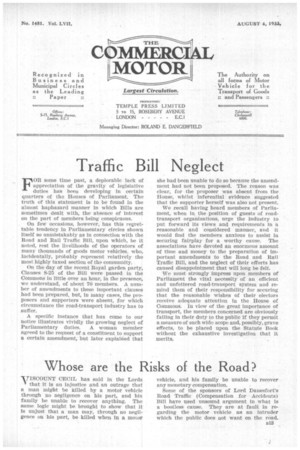Traffic Bill Neglect
Page 23

If you've noticed an error in this article please click here to report it so we can fix it.
FOR some time past, a deplorable lack of appreciation of the gravity of legislative duties has been developing in certain quarters of the Houses of Parliament. The truth of this statement is to be found in the almost haphazard manner in which Bills are sometimes dealt with, the absence of interest on the part of members being conspicuous.
On few occasions, however, has this regrettable tendency In Parliamentary circles shown Itself so unmistakably as in connection with the Road and Rail Traffic Bill, upon which, be it noted, rest the livelihoods of the operators of many thousands of goods motor vehicles, who, incidentally, probably represent relatively the most highly taxed section of the community.
On the day of the recent Royal garden party, Clauses 8-25 of the Bill were passed in the Commons in little over an hour, in the presence, we understand, of about 70 members. A number of amendments to these important clauses had been prepared, but, in many cases, the proposers and supporters were absent, for which circumstance the road-transport industry has to suffer.
A specific instance that has come to our notice illustrates vividly the growing neglect of Parliamentary duties. A woman member agreed to the request of a constituent to support a certain amendment, but later explained that she had been unable to do so because the amendment had not been proposed. The reason was clear, for the proposer was absent. from the House, whilst inferential evidence suggested that the supporter herself was also not present.
We recall having heard members of Parliament, when in the position of guests of roadtransport organizations, urge the industry to put forward its views and requirements in a reasonable and considered manner, and it would find the members anxious to assist in securing fairplay for a worthy cause. The associations have devoted an enormous amount of time and money to the preparation of important amendments to the Road and Rail Traffic Bill, and the neglect of their efforts has caused disappointment that will long be felt.
We must strongly impress upon members of Parliament the vital necessity of an efficient and unfettered road-transport system and remind them of their responsibility for securing that the reasonable wishes of their electors receive adequate attention in the House of Commons. In view of the great importance of transport, the members concerned are obviously failing in their duty to the public if they permit a measure of such wide scope and, possibly, grave effects, to be placed upon the Statute Book without the exhaustive investigation that it merits.




















































































